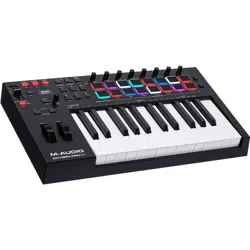Loading ...
Loading ...
Loading ...

19
9. Back Button: If entered into one of the Display’s Edit menus, press this button to go back to the main
Display screen.
If you are not viewing one of the Edit menus, this button will be assigned to a control. When operating
with a DAW, the assigned control will be predetermined. When operating with a preset or the User
DAW selected, the control can be edited. When editing a Preset or DAW name press the SHIFT button
and the Back button to delete a letter.
10. SHIFT Button: Hold the SHIFT Button while moving or pressing controls or buttons on the keyboard to
access their secondary functions. This button can also access secondary functions in DAWs.
11. << Button: Depending on what screen is selected in your DAW, this button will either rewind the open
song or move down in the active window. Some DAWs may require pressing the Oxygen Pro 61's
SHIFT button and << Button to move down in the active window.
12. >> Button: Depending on what screen is selected in your DAW, this button will either fast forward the
open song or move up in the active window. Some DAWs may require pressing the Oxygen Pro 61's
SHIFT button and >> Button to move up in the active window.
13. Loop Button: Press this button to activate/deactivate the loop function in your DAW.
14. Stop Button: Press this button to stop the open song in your DAW. Double-press this button to stop
the open song and return the playhead to the beginning of the song. Press SHIFT and this button to
send a MIDI panic message to turn off all Note messages and return all controls to zero.
15. Play Button: Press this button to play the song in your DAW.
16. Record Button: Press this button to activate recording in your DAW.
17. Bank Buttons: If operating in DAW Mode or one of the custom presets, use these buttons to switch the
currently selected bank for the Faders, Knobs, Pads, and Function Buttons. There are four banks for
these controls, giving you the equivalent of 36 Faders, 32 knobs, 32 buttons, and 64 pads. Pressing
SHIFT and the Bank < button will lock the SHIFT modifier ARP knob controls. This is useful for
changing ARP parameters during a live performance. Pressing SHIFT and the Bank > button will lock
the SHIFT modifier Pad controls. This is useful for making edits while mixing a song. To return the
knobs or pads to their normal mode, press the SHIFT button and the Bank < or Bank > button
.
18. Tempo Button: Tap this button to set Oxygen Pro 61’s tempo, or press and hold this button to pull up
the Tempo Edit menu on the Display. When the Temp Edit Menu is open, you can use the Select/Scroll
Encoder to manually enter the tempo and choose to sync Oxygen Pro 61’s tempo with your DAW. The
tempo setting affects the keyboard’s arpeggiator and note repeat functions.
Hold SHIFT and press this button to turn your DAW’s metronome on/off.
19. Note Repeat Button: Press this button to activate the note repeat function for the Pads. To latch the
note repeat function, hold SHIFT and then press this button. While Note Repeat is active the
Select/Scroll Encoder can be used to change the current Time Division setting of the Arpeggiator
and Note Repeat functions. Fader buttons 5 – 8 can also be used for changing the Time Division
setting of the Arpeggiator and Note Repeat functions
20. Pads (1–16): Use these velocity-sensitive pads to send MIDI Note On/Off messages or perform other
MIDI assignments (if using a preset or the User DAW). Hold SHIFT while pressing Pads 9–11 to
reassign the function of the Knobs, and hold shift while pressing Pads 13–16 to use the DAW
shortcuts.
21. Pad Row Play: Press this button to play through the audio clips assigned to each pad in the
corresponding row of pads. Depending on the DAW, these buttons will have different functions.
22. Faders (1–9): Push these Faders up/down to perform their assigned controls. When operating with a
DAW, the assigned controls will be predetermined. When operating with a preset or the User DAW
selected, the controls can be edited.
Loading ...
Loading ...
Loading ...
